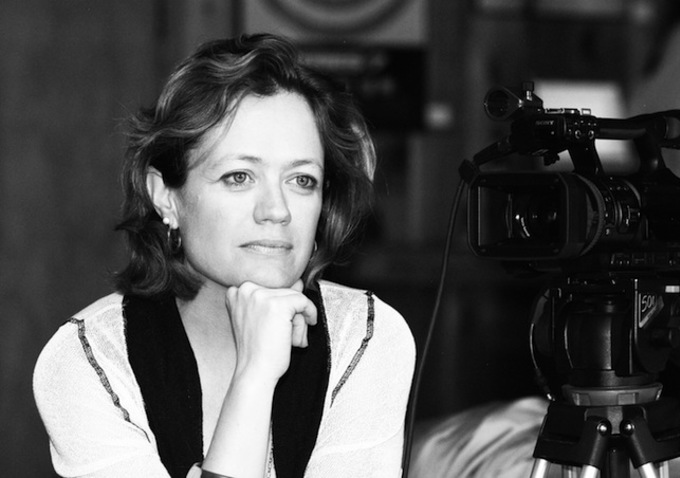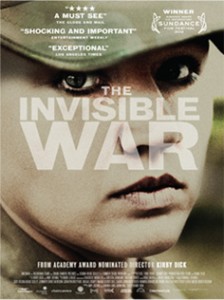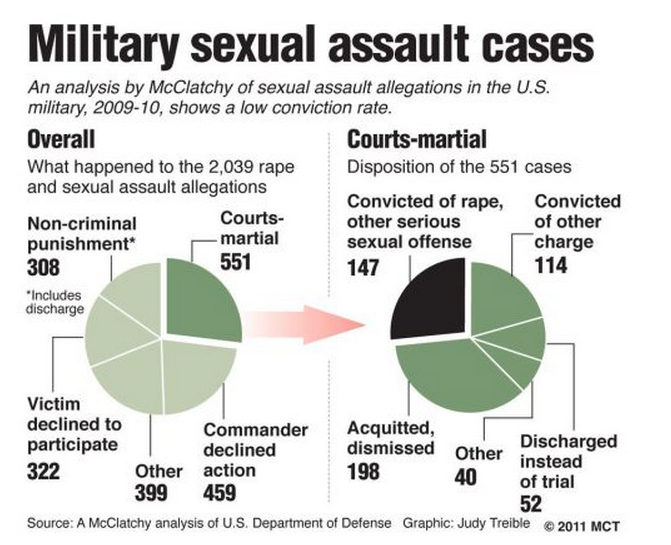Earlier this year, it was announced that Cara Mertes would be leaving her job at the Sundance Institute to take over for Orlando Bagwell at Ford Foundation’s JustFilms. In a world where foundations are more and more important financial resources for documentary filmmakers and “impact” is the buzzword of the day, Mertes held something of a town hall meeting at DOC NYC, in which she frankly asked documentary filmmakers what they needed from foundations like Ford.
 As more and more people, especially those circling the BRITDOC Foundation, advocate for documentary filmmakers to work with Impact Producers and elaborate impact campaigns, Indiewire followed up with Mertes to talk about the concept of impact. Below, she shares how she sees impact as an integral part of the creative force that makes documentaries successful in a wide variety of ways.
As more and more people, especially those circling the BRITDOC Foundation, advocate for documentary filmmakers to work with Impact Producers and elaborate impact campaigns, Indiewire followed up with Mertes to talk about the concept of impact. Below, she shares how she sees impact as an integral part of the creative force that makes documentaries successful in a wide variety of ways.
What are you most excited to take on as you start your new job?
What’s exciting to me about the job is the potential for bringing new resources into this field. I’m speaking globally, I want to bring creative, authentic, mostly non-fiction storytelling (as well as digital storytelling).
So the way that impact is being talked about, it’s about making sure that the film is doing the work it’s meant to do, and it’s something that the funders are concerned about, to make sure that their investment is well spent. How do you feel about that perception? [Ed: Dan Cogan of Impact Partners foregrounded this when he spoke at the Toronto International Film Festival earlier this year.]
I think I would reverse the formula that you presented. The question of impact is not driven by measurement and outcomes. The world that I now live in and work in is populated by people who want to make a difference in the world. A regranter and a creative and executive producer. How can we know that you’ve made a difference in the world? That question leads to better storytelling. That question leads to better resources. Questions about impact vary broadly. Being accountable for change is very important for filmmakers to take seriously. Now that I’m in a philanthropic position, that’s an important question for me. It’s almost a deep impulse: asking why are these stories told? It’s deeply embedded in the way of telling these stories for me.
But I know when you spoke at DOC NYC in conversation with Thom Powers, you mentioned that you were interested in developing new ways to talk about impact.
We want to define our terms when we talk about impact. It’s a measurement piece — what are the quantifiable? What are we measuring? Who are we talking about? It’s multiplicities of audiences. There are many different ways to impact those audiences. You’re talking about an extremely dynamic process. We don’t have language for and we don’t have tools for talking about it. that’s an incredibly interesting realm that we’re working in. How culture makes change — what we’re trying to do at Ford. The kind of work that we’re looking for, the work that Ford supports — of course we need ways of understanding what the numbers are and striving for the appropriate impact. We need more leadership and skill-building in terms of the question of impact. People that understand the mix of numbers with dynamics. Film impact is not predictable — how do we make room for that when we’re granting?
My predecessor Orlando Bagwell was working with Jana Diesner at the University of Illinois Urbana-Champaign on a project, and we’re going to do a phase two of funding for that. It’s a big data research tool that actually looks at the difference a doc might have made in knowledge and behavior using Facebook, Twitter, Tumblr, as well as any publicly available legal files. This search tool has been built to do wide ranging searches for terms, names… you can upload the transcript to your documentary. What’s really interesting is when you start applying it longitudinally, you start to see changes geographically and within social networks: What are you saying? Where are you saying it? Who are you saying it to? Is it negative or positive? The tool is open source and it will be free. We want this to be free to the creative community so they have tools that are scientifically validated and robust as commercial entities have.
When filmmakers approach you, what kinds of things excite you, with regards to the way they talk about impact? What kinds of things do you want to hear?
On a basic level, you ask them if they’re thinking about impact. A lot of people are saying “I’m not thinking about it and I don’t want that” — and that’s fine. I think it’s unfair to rely completely on the creative filmmaker — who has to move from being creative/coordinative — they have to function like a CEO of a corporation that comes into existence very quickly. The leadership tools are not ones that all filmmakers have. You look to them and you see if they can create a team around them that can engage with these issues.
Narrative is creative, but you cannot sacrifice fairness, accuracy, deep research, the forces at play in the issues you’re talking about. The filmmakers that are willing to dig in and question their process — can I do more? can I change the narrative in order to highlight something that I now understand better? It’s important that your subject changes as you’re making the film. As filmmakers, your subjects are changing and the issue is changing. You’re managing in multiple dimensions, trying to create these compelling narratives. You’re thinking about audience as well. We want to be vigilant that the creative conversation is paramount. But you can’t sacrifice these other elements. You need to be responsible to the subjects — these people that are giving you their lives, for sometimes very difficult access.
With regards to building a team around you, Jennifer MacArthur published a piece on the POV blog about impact producers. How important is carving out this space for you, for these people that are working on the impact of the film, outside of the production of the film itself?
A number of us were together in a retreat with US and UK producers with BRITDOC right before she wrote that. Impact is a question you ask at the beginning of your film — it can benefit your funding and the telling of your film. Often the conversation about impact changes your story. We’re looking to embed the questions of impact into the production process.
Part of the skill-building piece for this kind of work is to name the skills. These are high-level, sophisticated skills. As Jennifer says in her piece, no, your intern cannot do this. It’s building a case that this position needs funding and needs support — that it needs to be a part of film teams. We now have these tools, we can ask the question about impact as these films are being done, by looking at how the issue is changing during production. As you’re building and releasing your story, this person will work with the publicist and distributor, to work with the movement and change agenda that’s happening around your film.
What about the people who feel that thinking about impact is limiting? That it impinges on creative freedom?
For me, any time you decide you’re going to be a cultural creator, you’re asking people to listen to you and to take seriously what you’re creating. If you’re expecting people to spend time with you and your creation, you have a responsibility to your audience. You need to take these questions seriously if you want an audience. You’re always going to care about what people think. How much time do you want to spend on your impact strategy? There are examples of people who could care less about change but they do want an audience. I can talk to those people on those terms. “What do you want your audience to feel? These are the co-participants in your creative experience. How do you want them to feel?”
What I don’t expect is for filmmakers to say it doesn’t matter. A lot of filmmakers point to the fact that they don’t have a good answer to the questions that foundations are asking about impact. There is funder education that needs to be done so that funders are not led by the numbers. That’s a conversation in the donor world and the foundation world. Is it the means or is it the end? I completely agree with filmmakers who say that some people are led by that. The creative needs to be very strongly present.
You’ve spoken before about the need for the different projects and divisions within the Ford Foundation to work together on film projects. What is important about that?
If you’re not partnering, you’re not doing it right. I’m looking for partners at the institutional and individual level. Partnership and collaboration is profound. I see the world we live in as heavily networked, through the technology but also socially. There’s a phenomenon that the boundaries between disciplines and funding silos are more porous. There’s a term in the foundation world — intersectionality — that acknowledges we’re all in this together. You can’t talk about climate without talking about economy, health, gender. Every time you pull out an issue, you’re pulling out a bunch of other issues.
The fact that I see things that way is perfect for this job. We’re meant to work with all the other teams and see the commonalities. While our structures may pull out certain things, part of the job of the storytellers is to rebraid and recombine all of the complexities of human experiences that reflect all of these areas. There may be a labor story we tell we can find a gender story, a health story, a LGBT story. Recombining so it looks like a human experience is really important.
* * *
~ This interview originally appeared on IndieWire, December 13, 2013, and was conducted by Bryce J. Renninger.




